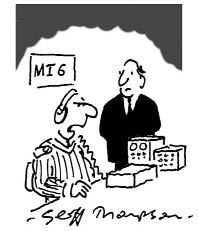The government is struggling to retain its reputation for competence.
The government is struggling to retain its reputation for competence. Ministerial ineptitude has become a dangerously large part of the major news stories in recent weeks, from the Libyan crisis to the scandal surrounding Prince Andrew. This should worry the coalition, because the public will not support government cuts or reforms to public services if people believe it is incapable of carrying them out.
Appearing competent is a prerequisite for successful government. The government will only get credit for what goes right if it is seen to be in charge. The team in No. 10, which has its share of veterans of the Major era, remembers that the economic recovery of the 1990s reaped no political dividend because the Tory reputation for economic competence had been destroyed on Black Wednesday.
Labour are well aware, too. They remember that the Brown government never recovered from the sense of incompetence created by its decision to bottle out of an election planned for October 2007. They also know that the bounce in the polls which tempted Gordon Brown to go to the country was created by the government’s steady handling of the attempted terror attacks, the floods and the foot-and-mouth outbreak of that summer. A competent government shapes events, an incompetent one is buffeted by them.
Ed Miliband’s team has now begun a full-blooded attempt to undermine the coalition’s reputation on this front. As one Labour source puts it, ‘we want to expose them as combining the ideology of Margaret Thatcher with the competence of John Major’.
This approach is designed for the 24-hour news cycle. Conservatives, now they are in government, complain that in our news-mad culture ‘every tiny slip-up is magnified into a disaster’. So two maladroit briefings on No. 10’s view of Prince Andrew’s role as trade envoy led to the story topping the bulletins for a day and a half, and lots of breathless discussion of the failures of the Downing Street communications machine.
But an even bigger advantage of Labour’s tactic is that modern government is so big and unwieldy that ministers simply do not know what is about to go wrong. There are more than 400,000 civil servants working for central government but only 119 ministers. Compounding this problem is that most ministers have little experience of running a large organisation.
Take the three top men in the government. Cameron was a political adviser and then a PR man before becoming a politician, Clegg a journalist, a trade negotiator at the European Commission, an MEP and a lobbyist and Osborne a journalist and then a political aide. None of them, along with the vast majority of the Cabinet, has had any managerial experience to speak of outside politics.
In an ideal world, this wouldn’t matter. Ministers would be able to tell their permanent secretary what they want done and it would happen. But modern-day Whitehall doesn’t work like that, if it ever did. As one government source puts it, ‘nothing happens if a special adviser isn’t on it, chasing it up’.
Special advisers are the sticking plaster solution to the deterioration in quality of the civil service. They are essential to a minister pushing his priorities through the swamps of Whitehall. But this government has relatively few of them because Cameron pledged before the election to reduce their number. The result is that ministers feel overwhelmed and political balls are being dropped left, right and centre.
Downing Street is becoming increasingly frustrated. It briefed journalists this weekend that a review was going on and ‘underperfoming’ special advisers would be dismissed. This prompted an embittered reaction from the special advisers who responded by pointing out the problems in the Downing Street operation.
When Craig Oliver, Cameron’s new communication director, received complaints that there was no one to call in No. 10 to find out what the government thinks on any given issue, his response was to distribute a list of Downing Street phone numbers. This missed the point that the complainants were talking about was the absence of a person — someone whose gaze ranges across government — not a number.
Even the Prime Minister is having to come up with ways to get around civil service obstructionism. When a crisis is brewing, his response is to call for Jeremy Heywood, the permanent secretary at No. 10, rather than the Cabinet Secretary Sir Gus O’Donnell, who is expected to retire next year.
I understand that there has been a loss of affection for Sir Gus after several confrontations over what information the new government can release about the actions of the old government. By contrast, Heywood is more flexible. He has become so trusted that the Prime Minister is even consulting him about Downing Street appointments.
For the moment, Downing Street is reassuring itself that Labour’s attempt to paint them as incompetent isn’t working. They point out that the government’s missteps on forests or Prince Andrew haven’t affected voters’ lives. But a succession of bungled responses can’t have gone unnoticed.
One person involved in the planning of the military rescue of Britons from the Libyan desert says that ‘everyone was very aware that if this went wrong it would be Cameron’s Carter moment’ — a reference to how the failure of a rescue mission to free the American hostages in Iran crippled the Carter presidency.
If Cameron wants to avoid the same fate as Carter, he needs to get a grip on this problem. His appeal as Prime Minister is built, in large part, around the sense that he is a natural at the job. But if, as one long-time ally puts it, ‘he goes from been seen as being unflappable and in effortless command to a bungling, chinless wonder, then he’s done for.’







Comments